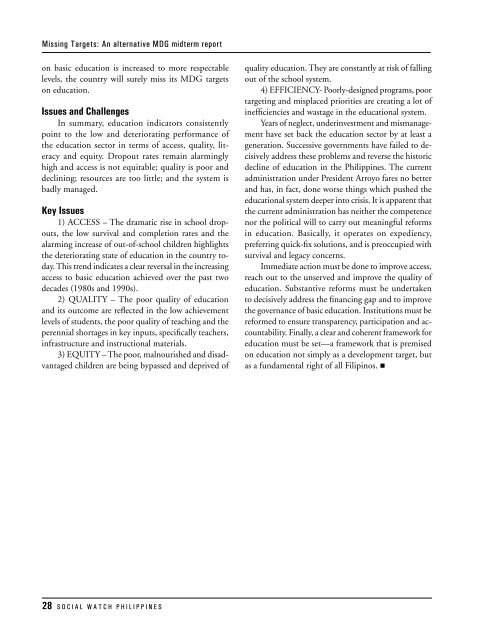one big file - Social Watch
one big file - Social Watch
one big file - Social Watch
Create successful ePaper yourself
Turn your PDF publications into a flip-book with our unique Google optimized e-Paper software.
Missing Targets: An alternative MDG midterm report<br />
on basic education is increased to more respectable<br />
levels, the country will surely miss its MDG targets<br />
on education.<br />
Issues and Challenges<br />
In summary, education indicators consistently<br />
point to the low and deteriorating performance of<br />
the education sector in terms of access, quality, literacy<br />
and equity. Dropout rates remain alarmingly<br />
high and access is not equitable; quality is poor and<br />
declining; resources are too little; and the system is<br />
badly managed.<br />
Key Issues<br />
1) ACCESS – The dramatic rise in school dropouts,<br />
the low survival and completion rates and the<br />
alarming increase of out-of-school children highlights<br />
the deteriorating state of education in the country today.<br />
This trend indicates a clear reversal in the increasing<br />
access to basic education achieved over the past two<br />
decades (1980s and 1990s).<br />
2) QUALITY – The poor quality of education<br />
and its outcome are reflected in the low achievement<br />
levels of students, the poor quality of teaching and the<br />
perennial shortages in key inputs, specifically teachers,<br />
infrastructure and instructional materials.<br />
3) EQUITY – The poor, malnourished and disadvantaged<br />
children are being bypassed and deprived of<br />
quality education. They are constantly at risk of falling<br />
out of the school system.<br />
4) EFFICIENCY- Poorly-designed programs, poor<br />
targeting and misplaced priorities are creating a lot of<br />
inefficiencies and wastage in the educational system.<br />
Years of neglect, underinvestment and mismanagement<br />
have set back the education sector by at least a<br />
generation. Successive governments have failed to decisively<br />
address these problems and reverse the historic<br />
decline of education in the Philippines. The current<br />
administration under President Arroyo fares no better<br />
and has, in fact, d<strong>one</strong> worse things which pushed the<br />
educational system deeper into crisis. It is apparent that<br />
the current administration has neither the competence<br />
nor the political will to carry out meaningful reforms<br />
in education. Basically, it operates on expediency,<br />
preferring quick-fix solutions, and is preoccupied with<br />
survival and legacy concerns.<br />
Immediate action must be d<strong>one</strong> to improve access,<br />
reach out to the unserved and improve the quality of<br />
education. Substantive reforms must be undertaken<br />
to decisively address the financing gap and to improve<br />
the governance of basic education. Institutions must be<br />
reformed to ensure transparency, participation and accountability.<br />
Finally, a clear and coherent framework for<br />
education must be set—a framework that is premised<br />
on education not simply as a development target, but<br />
as a fundamental right of all Filipinos. •<br />
28 S O C I A L W A T C H P H I L I P P I N E S

















